|
Asolene (Asolene) spixi
(d'Orbigny, 1837)
|
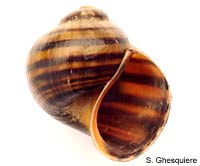 |
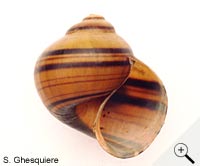 |
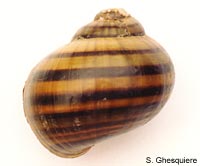 Asolene (Asolene) spixi. Eldorado do Sul, Rio Grande do Sul, Brasil. 06-05-2000. 39 mm high. |
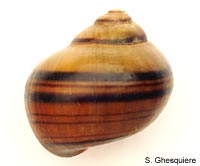 Asolene (Asolene) spixi. Eldorado do Sul, Rio Grande do Sul, Brasil. 06-05-2000. 36 mm high. |
Shell: The shell in Asolene spixi
has a pointed top and the aperture (shell opening) is oval in shape, in which
the corneous operculum can be retracted. The sutures are relatively flat and
the umbilicus is of medium size.
The shell surface is smooth and has a yellow base colour with sharp, dark brown
spiral stripes on it. These dark band are mainly located at the underside of
the shell (near the umbilicus), giving the shell a dark apperance when seen
from the underside and a light colour from above.
|
Interactive 3D-models (Java): |
Operculum: The corneous, medium thick operculum is concentric in construction
with the nucleus located near the center of the shell (towards the columella).
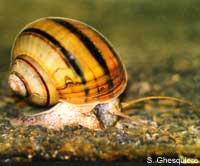 |
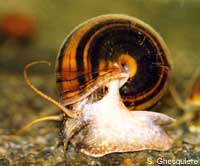 |
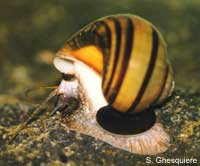 Asolene (Asolene) spixi. Note how high the snail keeps its shell. |
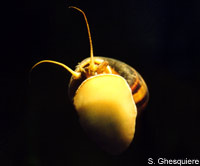 Asolene (Asolene) spixi on the glass of the aquarium. |
Body: A yellow to brown base colour with dark spots, mainly located
at the back of the foot and on the
head.
The tentacles are about the length
of the foot when completely extented and breathing siphon
is short (about the length of the labial tentacles).
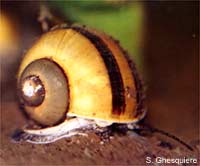 Asolene (Asolene) spixi. Well visible are the distinct bands on the shell. |
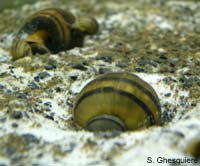 Asolene (Asolene) spixi often burries in the soil during the day. |
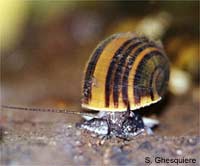 Asolene (Asolene) spixi. |
|
Interactive 3D-models (Java): |
Eggs: The eggs are deposited below the water surface (aquatic) on objects or vegetation and are embedded in a gelatinous mass.
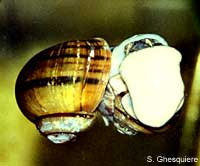 Asolene (Asolene) spixi snails mating (male at the left, female at the right). |
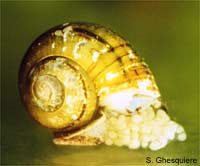 Asolene (Asolene) spixi depositing eggs on the wall of an aquarium. |
Behaviour: Asolene spixi is a relatively slow apple snail compared
to many other apple snail species like Pomacea canaliculata.
Asolene spixi is a noctural animal that rarely moves during the day and
mostly hides in the soil. During the winter months, this snail species can become
very inactive and remains partly burried in the soil until the tempertures raise
in spring.
A remarkable thing these snails exhibit when walking on vertical smooth surfaces
(glass) or into the direction of the water flow is their creeping locomotion.
The foot is first extented at the front and shortly after the back of the foot
follows. In other words, the foot is extended and contracted to move around.
An example of this can be seen in this mpeg movie: [Asolene_walk]
(140kb). The speed of the movie is increased a 10 fold to give a better idea
what happens. Compare the walk of this Asolene spixi with the smooth
and contant moving of this Pomacea canaliculata
snail: [Pomacea_walk] (210kb).
Also note the speed difference as the Pomacea canaliculata movie is only
3 times increased in speed.
However, when walking over the horizontal surfaces like the bottom or over soft
material like debris and mud, Asolene spixi moves with a constant locomotion,
which can be considered the 'standard' way of locomotion in apple snails.
Another thing which attracts attention in Asolene spixi is the way the
shell is kept during walking (see photographs
above). It almost appears that the snail tries to keep the shell as far as possible
above it's foot.
Habitat: Asolene spixi lives
in a wide variety of habitats, from rivers, ditches and canals to lakes.
Distribution: Southeastern of Brasil: Rio Grande do Sul and Rio Parana.
This region has a sub-tropic climat with relatively hard winters.
In Cáceres, Mato Grosso State, Brasil, one can find an Asolene sp.
that could well be considered a variety of Asolene spixi.
Common name: Zebra apple snail.
Similar to: Asolene pulchella
With thanks to Fabio Faraco for providing the shells and snails which are displayed on this page.
|
Except where otherwise noted, this page is licensed under a Creative Commons Attribution-NonCommercial-ShareAlike 2.5 License . http://www.applesnail.net |
|